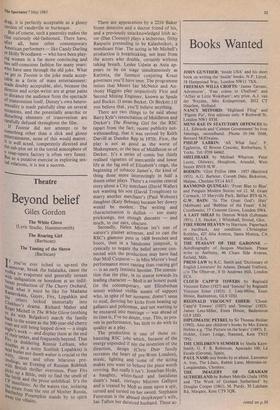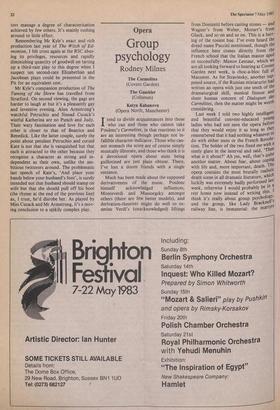Theatre
Beyond belief
Giles Gordon
The White Glove (Lyric Studio, Hammersmith) The Roaring Girl (Barbican) The Taming of the Shrew (Barbican)
f you've ever itched to up-end the
sam°var, break the balalaika, cause the vo.clka to evaporate and generally scream Ith indignation or boredom at an indif- lerent production of The Cherry Orchard, think what it must be like for Madame Ranievskaia, Gayev, Firs, Lopahkin into _the others locked immortally into `-hekhov's drama. Richard Maher and koger Michell in The White Glove (nothing t,_° do with Bulgakov) march the family back to the estate as the 300-year-old cherry trees are still being lopped down — a single
ht's work — and display them at the end
Firs tether, and frequently beyond. That ,,irs (a doddering Ronnie Letham, who °211,131es as a noisy Scottish Lopahkin) is
(-1,,e.ar butler not dumb waiter is crucial to the _witty, clever and often hilarious pro-
ceedings, I an Evening of Russian Rubbish With British thriller overtones. Poor Firs Picks up a Bible, only to find the smell of cpe °00k and the prose unbiblical. It's the 0, manifesto. As the waters rise, isolating th estate from the rest of Mother Russia,
:attleshin PotemPkin wa stands by to spirit Y the villains. There are appearances by a 221b Baker Street detective and a doctor friend of his, and a previously unacknowledged Irish ac- tor (Dan Clooney) plays a lecherous, filthy Rasputin pretending to be Kalashnikov, a mendicant friar. The acting in Mr Michell's production is breathtaking, not least from the actors who double, certainly without taking breath. Leslee Udwin as Ania ap- pears to be on stage simultaneously as Karlotta, the funniest conjuring Kraut governess you'll have seen. The programme insists that Messrs Ian McNeice and An- thony Higgins play respectively First and Second Mining Engineer, known as Spade and Bucket. (I mean Becket. Or Beckett.) If you believe that, you'll believe anything.
There are two things to be said about Barry Kyle's resuscitation of Middleton and Decker's The Roaring Girl for the RSC (apart from the fact, recent publicity not- withstanding, that it was revived by Keith Darvill at Dundee Rep in 1970). First, the play is not as good as the worst of Shakespeare, or the best of Middleton or of Decker. It's a series of comic but thinly realised vignettes of mercantile and lower life at the fag end of Elizabeth's reign, the beginning of tobacco James's, the kind of thing done more interestingly in half a dozen other plays. There's a routine central story about a City merchant (David Waller) not wanting his son (David Troughton) to marry another merchant's (Paul Webster) daughter (Katy Behean) because her dowry would be modest. The writing and characterisation is dullish — too many pricksongs, not enough descants — and much, to our ears, obscure.
Secondly, Helen Mirren isn't one of nature's plainer actresses, and to cast the RSC's glamour puss in 1608 breeches and boots, then in a handsome jumpsuit, is cynically to negate the belief anyone con- nected with the production may have had that Moll Cutpurse — in Miss Mirren's loud performance more ranting than roaring girl — is an early feminist heroine. The conten- tion that the play, in its stance towards its leading character — Moll is an honest punk (in the contemporary, not Elizabethan sense) without visible means of support who, in spite of her surname, doesn't seem to steal, deriving her kicks from beating up gallants and policemen, and not wanting to be ensnared into marriage — was ahead of its time is, I've no doubt, true. This, as pro- ven in performance, has little to do with its quality as a play.
The production is one of those ex- hausting RSC jobs which, because of the energy expended if not the invention of the direction, design (Chris Dyer fussily recreates the heart of pre-Wren London), music, lighting and some of the acting makes you want to believe the piece worth reviving. But really it isn't. Jonathan Hyde, a haughty, white-faced and fastidious death's head, corrupts Mistress Gallipot and is treated by Moll as meat upon a spit, turned and turned on her sword. Stephanie Fayerman is the abused shopkeeper's wife, Ian Talbot her deceived husband. These ac-
tors manage a degree of characterisation achieved by few others. It's mainly rushing around to little effect.
Remembering Mr Kyle's exact and rich production last year of The Witch of Ed- monton, I felt cross again at the RSC abus- ing its privileges, resources and rapidly diminishing quantity of goodwill on tarting up a third-rate play to this degree when I suspect ten second-rate Elizabethan and Jacobean plays could be presented in the Pit for an equivalent cost.
Mr Kyle's companion production of The Taming of the Shrew has travelled from Stratford. On second viewing, the gags are harder to laugh at but it's a pleasantly gay and inventive evening. Alun Armstrong's watchful Petruchio and Sinead Cusack's wistful Katherina are no Punch and Judy. Their wary fascination and love for each other is closer to that of Beatrice and Benedick. Like the latter couple, surely the point about petulant Petruchio and cursed Kate is not that she is vanquished but that each is attracted to the other because they recognise a character as strong and in- dependent as their own, unlike the am- bitious twitterers around. The problematic last speech of Kate's, 'And place your hands below your husband's foot', is surely intended not that husband should stamp on wife but that she should pull off his boot (the rhyme at the end of the previous line) as, I trust, he'd disrobe her. As played by Miss Cusack and Mr Armstrong, it's a mov- ing conclusion to a spikily complex play.











































 Previous page
Previous page